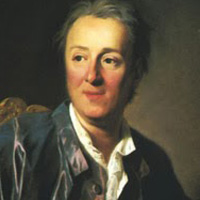Denis Diderot - Biography and Works
Denis Diderot (1713-84) was a leading Enlightenment thinker, editor-in-chief of the Encyclopedia. He was remarkable versatile, writing novels, satires, dramas, critical essays on art and literature, essays on natural science and medicine, and letters on most subjects. His philosophical outlook underwent a change from radical deism to an even more radical atheism.

Denis Diderot (1713-84)
In developing his materialist philosophy he rebutted the classical objections that it cannot account for the origin of motion, of life, and of mind, arguing that nothing prevents us from assuming that among the basic characteristics of every particle of matter are the potential for motion, life and mind; there is, then, no need to assume an immaterial or supernatural agency. His political philosophy was radical: sovereignty ultimately resides with the people. He also gave a powerful criticism of the political institutions of this time. As is evident from the Encyclopedie, he saw the value of technology. He admired the ingenuity and skill of human achievements in the mechanical arts, and understood their enormous potential to eliminate drudgery and so improve the human condition. Diderot’s encyclopedic tradition has both historical and intellectual importance. They had a purpose to prepare a secular Bible, by rejecting the religious Bible as a source of all knowledge. Encyclopedia then was thought to be a proper source of knowledge.
